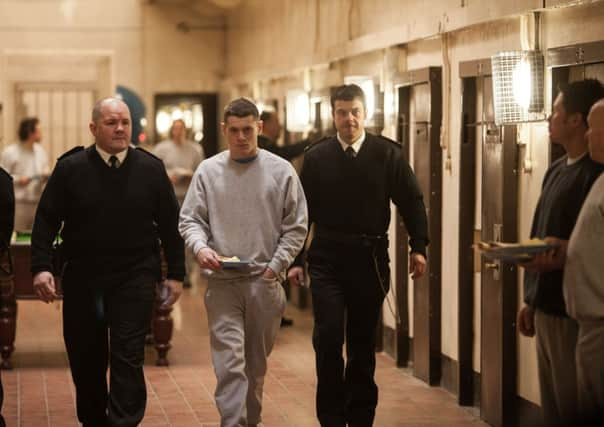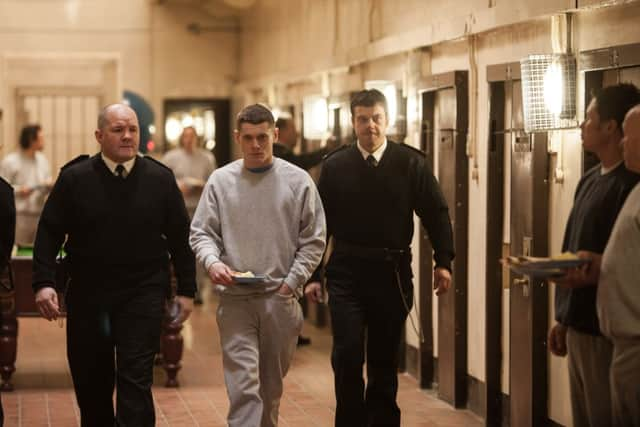Film reviews: Starred Up | Labor Day | Salvo


Starred up (18)
Directed by: David Mackenzie
Starring: Jack O’Connell, Ben Mendelsohn, Rupert Friend, Sam Spruell


Rating: * * * *
David Mackenzie makes a forceful return to form with Starred Up, a bruising prison drama that makes good on the promise he exhibited with Young Adam and Hallam Foe, but which seemed to go AWOL with successive howlers Spread, You Instead and Perfect Sense. Set in a penitentiary peopled with ruthless lifers, corrupt prison guards and idealistic do-gooders, it’s a film that takes the tired tropes of the British prison movie and makes them vital and interesting again, exploring as it does the revolving-door nature of the criminal justice system via a complex father-son story.
Advertisement
Hide AdRising star Jack O’Connell is the son in this particular equation: a 19-year-old called Eric Love whose propensity for violence has resulted in his early transfer from a young offenders institution to the same prison as his estranged father, Neville (Ben Mendelsohn). Whether by design or otherwise, Eric’s early transfer (the nomenclature for which is the source of the film’s title) is a potential spanner-in-the-works for the smooth running of the prison, which mirrors society at large in as much as order is maintained by the wilful collusion of profit-motivated criminals and authority figures, neither of whom want the free-flowing trade that keeps them in relative comfort interrupted by the savagery of those with nothing to lose and everything to prove.
Eric can certainly be seen as a disruptive force. In the film’s near-wordless opening, he demonstrates his street smarts and his mettle, first by taking the ritual humiliation of his induction with the sort of unfazed calm of a veteran offender, then by quickly fashioning a shiv from a toothbrush and a safety razor and resourcefully hiding it in the light fixtures for later use. Though this makes it clear from the off that he’s not some neophyte, Mackenzie and O’Connell – working from a richly detailed script by Jonathan Asser – take care to show he’s not some cocky teen, fronting in an attempt to protect himself until he can get his bearings. He’s much more atavistic than that, instinctively weighing up the consequences of his every move in a way that that will allow him to not just survive, but thrive.
What’s fascinating here is that this set-up isn’t used a springboard for a predictable prison story of ascension through detention. Neville – long dormant paternal instincts kicking in the moment he sees his boy on the yard – may reach out to Eric, keen to mould him in his own image as a respected hard nut with the ear of the prison kingpin (Peter Ferdinando). But Eric, whose distrust of everyone is revealed to have some pretty dark roots, gets the measure of his father faster than his father does him; he’s his own man and when volunteer prison counsellor Oliver (Rupert Friend) secures him a place in his anger management discussion group, Eric is self-possessed enough to recognise its potential benefits.
Once again, the film never goes in quite the direction one might expect. Mackenzie avoids the battle-for-the-soul theatricality such plot dynamics suggest in favour of more nuanced storytelling, infusing the therapy sessions with a foul-mouthed authenticity that prevents the film from falling into any of the touchy-feely traps it could easily have fallen into. These sessions are funny and disturbing, as liable to erupt in violence as they are in laughter (or both – as happens when Eric, in a bid to avoid a beating at the hands of group of guards, clamps his jaws shut over a prison officer’s family jewels).
Such an approach is bolstered by Paisley born cinematographer Michael McDonough (Winter’s Bone), whose roving, hand-held camera work allows Mackenzie and his cast to capitalise on the film’s real-life locations (it was shot in Crumlin Road Gaol in Belfast and HM Prison Maze in Lisburn) with a documentary-style rawness that does actually seem fresh – no mean feat in an age in which vérité-mimicking filmmaking has become ubiquitous. That’s partly down to good writing too. Asser’s script – his first to be produced – confidently drip-feeds information, ensuring the characters remain compelling throughout, which in turn allows Mackenzie to be judicious in his use of violence, never exploiting it for the sake of it, even as the film builds towards a bloody conclusion.
But it’s the strength of the performances that really makes Starred Up a cut above most British dramas, particularly those of Mendelsohn and O’Connell. Betraying no hint of his Australian roots, Mendelsohn makes Neville a more unpredictable patriarch than one might expect, one whose wounded pride at the realisation he’s failed his son starts manifesting itself in increasingly irrational ways. O’Connell, meanwhile, has that rare ability to shrink the distance between the scene, the screen and the audience; as Eric he bleeds authenticity as a matter of course, turning a story about imprisonment into a break-out success.
Labor Day (12A)
Directed by: Jason Reitman
Starring: Kate Winslet, Josh Brolin
Rating: * *
Advertisement
Hide AdIt takes a while for Labor Day to fully reveal itself as the slice of over-egged, sugary nonsense it really is, and appropriately enough, writer/director Jason Reitman does so – unintentionally one assumes – with some erotically charged pie baking. The pie in question is comprised of succulent-looking peaches, but the quivering surrounding its production involves something altogether riper: Kate Winslet doing her distressed suburban mother schtick for the umpteenth time as her character, Adele, an agoraphobic divorcee with a 13-year-old son, who falls for the world’s most considerate escaped murderer.
This is Frank (Josh Brolin), a goateed outlaw, on the run from the cops. But basically a good man who has “never intentionally hurt anyone in his life”. Although he imposes himself on the already fearful Adele in a violent manner – threatening her son Henry (Gattlin Griffith) in a supermarket; forcing her to take him home so he can lay low from the cops and recover from a bullet wound – he’s not a discourteous hostage taker. He may tie Adele up at first, but he also cooks her chili and fixes her taps. In fact, the volume of tasks he sets about doing makes him more of a hunky home help than an ambiguous threat.
Advertisement
Hide AdAll the DIY, of course, functions as a big metaphor: Adele is a broken woman who needs fixing and Frank is the one who can potentially make her whole again. This is roughly the point at which Adele and Frank start expressing their carnal desire for one another with pastry and peaches – Brolin doing the baking, Winslet doing the shaking. It’s also the point at which it becomes harder to suppress the impulse to snigger, particularly as all the lusty talk of crusts and fillings gives way to the sort of chaste, off-screen love-making more befitting a Hayes Code-constrained melodrama from the 1950s than a modern film set in 1987.
As the authorities close in on Frank, the film offers few surprises beyond the one likely to greet fans of Reitman’s past work. Thank You for Smoking, Juno, Up in the Air and Young Adult were, after all, blackly comic character studies that demonstrated a remarkable ability to blend cynicism with sincerity without cancelling either trait out. In attempting his first straight-up drama, though, Reitman has eschewed funny and inadvertently whipped up something laughable.
Salvo (12A)
Directed by: Fabio Grassadonia and Antonio Piazza
Starring: Saleh Bakri, Sara Serraiocco, Luigi Lo Cascio, Mario Pupella
Rating: * * *
Winner of the Critics’ Week Grand Prize at Cannes last year, this tale of a Sicilian hitman begins, quite literally, with all guns blazing as its protagonist (Saleh Bakri) is ambushed by a rival gang of mafia hoods. Turning the tables on them, he manages to extract the identity of the man who ordered the hit, but as he sets about exacting revenge, his planned attack is complicated by the presence of his target’s blind sister (Sara Serraiocco), whose awareness that someone is lying in wait in her house is the source of the unbearable tension that enhances directors Fabio Grassadonia and Antonio Piazza’s technically audacious opening act. That alone makes it worth seeing, which is just as well, because thereafter, the film reverts to a more conventional redemption saga that never follows through on that initial promise.
About Last Night (15)
Directed by: Steve Pink
Starring: Kevin Hart, Michael Ealy, Regina Hall, Joy Bryant
Rating: * *
A remake/update of the Rob Lowe/Demi Moore rom-com that sanitised David Mamet’s source play Sexual Perversity in Chicago, this finds Bachelorette screenwriter Leslye Headland attempting to update Mamet via the movie version while also turning it into an edgier vehicle for Ride Along’s Kevin Hart. Unfortunately all those demands conspire against the film, largely because director Steve Pink makes everything too neat and glossy when the ribald nature of the dialogue suggests a rawer approach would have been more suitable. Taking the Jim Belushi role, Hart gets to run his mouth and be obnoxious towards his on-again/off-again girlfriend (Regina Hall), but his performance hews too closely to his comic persona to feel like much of a progression.
A Long Way Down (15)
Directed by: Pascal Chaumeil
Starring: Aaron Paul, Imogen Poots, Pierce Brosnan, Toni Collette
Rating: *
Advertisement
Hide AdJust a week after the dismal Need for Speed, Aaron Paul and Imogen Poots find themselves in another car crash of a movie, this time as one half of a quartet of depressed souls who decide to kill themselves on New Year’s Eve but become a de facto support group for one another instead.
Along with Pierce Brosnan (cast as a disgraced television personality) and Toni Collette (as a barely-holding-it-together single mum), Paul and Poots – he’s a failed musician who announces that he has brain cancer; she’s the emotionally damaged daughter of a politician mourning the disappearance of her sister – do their best to inject personality into it proceedings.
Advertisement
Hide AdSadly, French director Pascal Chaumeil relies too heavily on transposing large chunks of text from Nick Hornby’s source novel to explain the characters’ dilemmas – something that gives the film all the dynamism of an audiobook.
Yves Saint Laurent (15)
Directed by: Jalil Lespert
Starring: Pierre Niney, Guillaume Gallienne, Charlotte Le Bon
Rating: * *
An ability to infuse haute couture with high culture was the bedrock of Yves Saint Laurent’s success, suggests this new biopic of the late French fashion behemoth. Too bad the film doesn’t do the same. Framed as a love story between Laurent (Pierre Niney) and his business partner, the industrialist Pierre Bergé (Guillaume Gallienne), it runs through two decades of their life together – tracing Laurent’s development from shy prodigy of Christian Dior to maverick in his own right – without offering much insight into the man or his revered creativity. The clothes may look good, but the film feels shapeless.